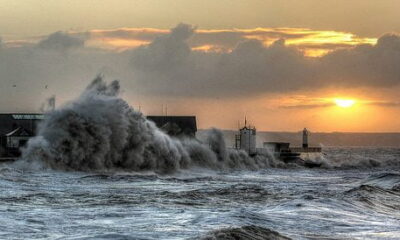

Energy
Transcript: Foreign Secretary’s Clean Energy Future speech
Foreign Secretary, Philip Hammond speaks about investing in a ‘clean energy future’, in Masdar City, United Arab Emirates. In his speech he said: “I believe the time to invest in that future is now.” and praised the UAE’s: “vision and leadership which has enabled such a prosperous state to thrive in this desert in such a short time.” He stated that the “The UK shares [their] vision.”
Thank you to Minister al Jaber for his kind welcome.
It is wonderful to stand here in Masdar City, this facility that embodies a vision of the energy supply of the future. In particular I am very pleased that Masdar is investing in clean technology in the United Kingdom.
Last year, you acquired a 35% stake in Dudgeon’s offshore windfarm, and you have also purchased a 20% stake in the London Array offshore wind project, which is the world’s largest offshore windfarm. Together, these equate to an investment of around 1 billion pounds, making the UAE one of the largest investors in the UK’s wind energy sector.
It is investments like these that are catalysing remarkable progress in renewable energy technology around the world. This progress is evident from the dramatic fall in costs we have seen over recent years: the price of solar panels has fallen by 80% since 2008, and the price of wind turbines has fallen by more than a quarter since 2009. This is increasingly allowing these energy sources to compete on cost with fossil fuelled power generation, without need for subsidy.
I want to describe what I believe this means for our two countries, for this region, and for the world.
UAE and UK: Vision and Partnership
I praise the vision that your leaders have shown. It is this vision and leadership which has enabled such a prosperous state to thrive in this desert in such a short time.
Although you have achieved great prosperity, you have not stopped looking to the future. You have the world’s seventh largest reserves of oil and gas, and we all know these will continue to be important for decades to come. Even so, you are already planning for a future beyond oil.
Your country is investing in some of the world’s largest solar power plants, and is at the forefront of innovation in technologies such as high-efficiency solar-powered desalination.
Not only that, but as the hosts of the International Renewable Energy Agency, you are promoting best practice in the policy, technology and financing of renewable energy around the world.
The UK shares your vision. At the same time as investing in research into low carbon technologies, we have carried out far-reaching reform of our electricity market, paving the way for up to £50bn to be invested in renewable energy over the period from 2014 to 2020. We are on track to bring the share of our electricity coming from renewable sources up to 30% by 2020, from the nearly 20% it stands at now. Seven years ago we became the first country to pass legislation setting out a clear path to decarbonising our economy.
Since then, more than sixty countries have followed with climate legislation of their own.
We share your vision that the decarbonisation of the world economy is a great opportunity for innovation, jobs and growth. In the UK, firms related to low carbon goods and services employed over 460,000 people and contributed 45 billion pounds to the UK economy in 2013. This is an increase of almost 30% in 3 years.
Partnership between our two countries is already playing a role in this success. I already mentioned the UAE’s investment in renewable energy in the UK. Similarly, Shell and BP, having invested in the UAE’s oil and gas industry for decades, are now contributing their expertise to new ventures in renewable energy and clean technology.
The Wider Region: Follow UAE’s Lead
Here in the Middle East, it is solar energy that stands out for its vast potential. Some experts have estimated that the Middle East and North Africa region holds more solar energy potential than the entire world’s electricity demand. The abundance of this energy resource holds the promise not only of meeting domestic energy needs, or even exporting electricity beyond the region – but also of spurring the development of world-leading technology that will be in ever greater demand.
The countries of this region have great wealth, as a result of your traditional energy resources. If, like the UAE, you choose to invest it in renewable energy, then you will be investing in your futures. In a clean future, and as part of a fast growing global market.
The Global Transition: An Investment in the Economy of the Future
Globally, we are already seeing dramatic changes. Global investment in renewable energy grew by 17% to reach 270 billion dollars in 2014. In 2013, additions of renewable energy generating capacity exceeded that of fossil-fuelled power for the first time ever.
The global market in green bonds, which barely existed a decade ago, is now growing exponentially – from around 2 billion dollars in 2011, to some 66 billion dollars by June 2015.
The global low carbon economy is already valued at around 6 trillion dollars and is growing at between 4 and 5% per year.
These trends can only continue to grow, as ever more countries commit to reducing their emissions, and as far-sighted leaders begin to plan for the complete decarbonisation of their economies over the course of the century. An investment in clean energy is an investment in the economy of the future, and those who move quickly will have the advantage.
A Global Deal: Seize the Moment
I believe the time to invest in that future is now.
As we all know, this is not an investment decision like any other. An investment in clean energy is an investment in a safe climate.
If we take the wrong decisions, we will leave for future generations not only depleted resources, but a more dangerous world. While the UK would suffer from more extreme rainfall, storms and flooding, this region would be at risk from ever more extreme heat, water scarcity and drought. All our countries would face risks to our coastal cities, our food security, our public health – and even our national security. Climate change knows no borders, and will respect no sovereignty.
It is because of these stakes, that we must make not only economic commitments, but also political commitments.
In December, the world will gather in Paris for the United Nations Conference on Climate Change. Rightly, because climate change is a global challenge, our political response to it is also global.
A strong and effective global deal will give all countries confidence in the direction of travel. It will level the playing field, catalyse investment, and spur innovation.
The signs are that such an agreement is within our reach. More than 150 countries have made commitments to reduce their emissions over time. Not only developed countries, but also large emerging economies are taking real steps towards a safe, sustainable and prosperous energy future.
I warmly welcome the UAE’s/your own country’s commitment, announced last week. Your target to achieve a quarter of your energy from clean energy sources within six years is a bold one.
I urge the countries of this region to follow this example, to support a strong agreement – with ambitious national commitments, and with leadership in the negotiations. Support us in securing a deal where all countries can contribute to tackling climate change, and where all can benefit from the coming boom in renewable energy and clean technology.
Conclusion
Just over a month before the Paris Summit, all countries have a choice.
They can do very little, fail to support a deal at Paris, and hope that climate change won’t affect them.
Or they can take a lead from the UAE and institutions like Masdar, and invest their wealth in renewable energy and clean technology.
They can prepare for a future where they have taken advantage of the booming market in green technology. Where companies invest in this region. Where almost half of the world’s renewable energy may be generated.
And they can prepare for a future in which the world has come together to successfully tackle the threat of climate change.
Thank you.


 Features11 months ago
Features11 months agoEco-Friendly Cryptocurrencies: Sustainable Investment Choices

 Energy11 months ago
Energy11 months agoThe Growing Role of Solar Panels in Ireland’s Energy Future

 Energy10 months ago
Energy10 months agoGrowth of Solar Power in Dublin: A Sustainable Revolution

 Energy10 months ago
Energy10 months agoRenewable Energy Adoption Can Combat Climate Change




























